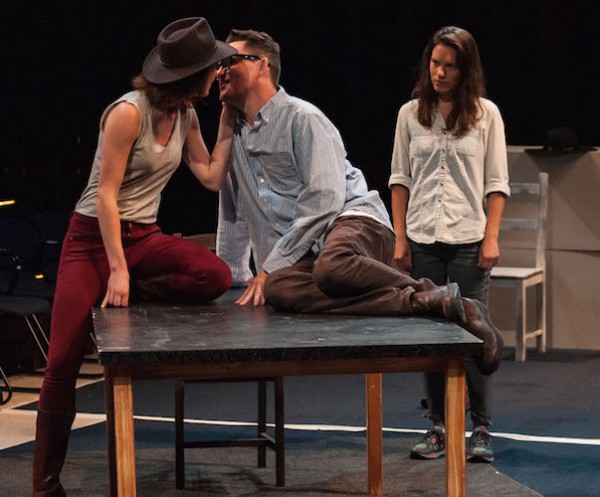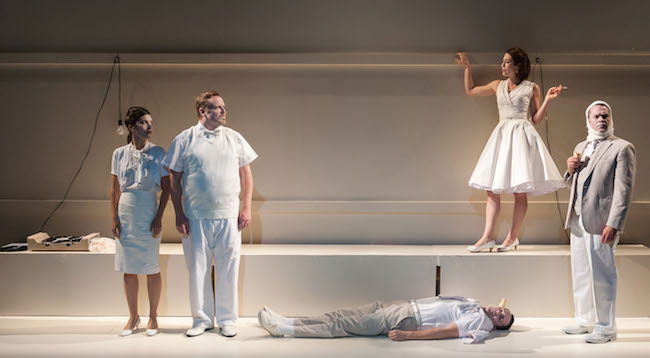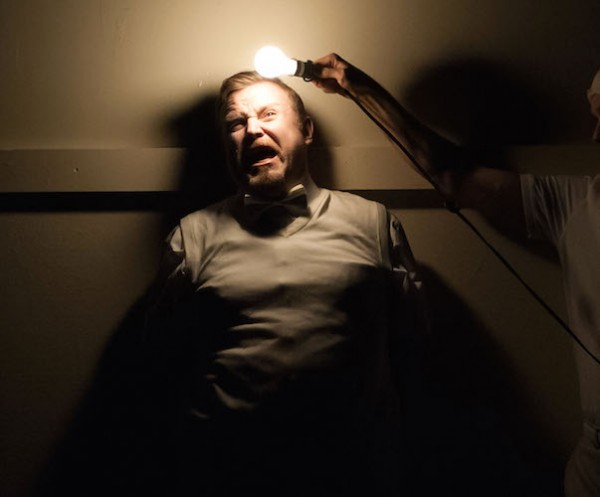Theater Review: Bedlam’s Transfixing, Twinned Twelfth Nights
There is nothing quite so exhilarating as watching Shakespeare done right – except, perhaps, watching one of his plays done right, twice.
Twelfth Night: Twelfth Night (or What You Will) and What You Will (or Twelfth Night), by William Shakespeare. Directed by Eric Tucker. Nora Theatre Company presents the Bedlam stagings in rep at the Central Square Theater, Cambridge, MA, through July 10.

Kelly Curran, Eric Tucker, & Susannah Millonzi in Bedlam’s “Twelfth Night.” Photo: A.R. Sinclair Photography.
Arts Fuse interview with Bedlam director Eric Tucker about the Twelfth Night productions.
By Kamela Dolinova
Twins are a classic comedy device, rife with possibilities for mistaken identity, trickery, and the separation/reunion stories that were so beloved by Shakespeare and his sources. Twelfth Night, or What You Will is perhaps the most popular of the Bard’s comedies, perhaps because it mixes another Shakespeare favorite – gender-bending – into its twin-dependent plot. For four hundred years, audiences have flocked to see Viola, dressed as her brother Sebastian, struggle with her love for the Duke Orsino, who loves the lady Olivia…who loves the man she thinks Viola is. Toss in the complication that, in Shakespeare’s day, all the players were male, and the doubling and bending becomes, as Olivia proclaims upon seeing both twins, “Most wonderful!”
Given this doubled-up set-up, Bedlam Ensemble Theatre’s choice to run twinned productions of the play in repertory feels both new and obvious. Working from the same beloved text and with the same five actors, the two productions are radically dissimilar yet mirror each other. With playfulness and dexterity, Bedlam projects questions about identity, gender, appearances, love, and revenge through a theatrical prism that discloses new colors and shades in one of the Bard’s most beloved texts.
Primary credit for these marvelous productions must go to the ensemble itself: the elegant and mercurial Kelley Curran; Edmund Lewis, whose mere presence on the stage serves as a reassuring anchor; Susannah Millonzi, who dances easily from comedic mastery to raw vulnerability; Tom O’Keefe of the sorrowful voice and soulful eyes; and actor-director Eric Tucker, who can apparently become whomever he wants. Each actor plays a multitude of roles – making quick silver changes in personae – with hardly a costume change in sight. The result is not one but two Twelfth Nights that disclose new potentialities, themes, shivers, laughs, and heartbreaks in a play I have assistant directed, acted in, studied extensively, and seen countless times. I left the theatre thunderstruck, humbled in the best way — I learned how little I knew about a play I thought I knew inside-out.

Susannah Millonzi, Edmund Lewis, Eric Tucker (on floor), Kelly Curran, & Tom O’Keefe in Bedlam’s “What You Will.” Photo: A.R. Sinclair Photography.
What order you should see the plays in is an open question, but Twelfth Night, followed by What You Will, seems right to me. Twelfth Night is the more traditional rendition of the two, hewing truer to the script. This simple, unadorned treatment – even given its sometimes radical staging choices – paves the way for the more stylized, surprising world of What You Will. Taking in the traditional before the more experimental version will highlight the tantalizing resonances between the two productions, particularly regarding the doubling and tripling and gender bending of the cast members.
Twelfth Night opens with all five actors on stage, wearing street clothes. Only O’Keefe’s Feste, who sits playing his guitar, looks as if he is performing on stage. The play is filled with music: intimate acoustic covers of Neil Young and Neutral Milk Hotel blend with original songs set to Shakespeare’s words. The gentle musical underscoring, coupled with the actors’ easy way with the text, suggest we are in someone’s living room, sipping wine during a late night get together, listening to talented performers casually read Shakespeare aloud. At times, the ensemble even meta-comments on the play. “He plays the viol de gamboys!” Tucker’s Sir Toby insists in defense of Sir Andrew Aguecheek, then deflates and admits, half to the audience, “I don’t know what it is.”
There is a deep sadness at the center of this production and each of the players taps into that melancholic core, from Millonzi’s hilarious burned-out hillbilly Sir Andrew to her barely-holding-it-together Olivia; from O’Keefe’s enigmatic, discontented Feste to Curran’s world-weary Maria. Here the late-night drunken shindig comes across as an exercise in pathetic four a.m. staggering, not raucous one a.m. partying. Sir Toby’s “lethargy” is a textbook case of alcoholism, deliberately disturbing and tragic. Certain moments are brilliantly toyed with: when Olivia decides to send her “ring in chase” to Viola she has trouble getting it off her finger. Standing on the table that serves as the play’s only furniture, she reaches out for Malvolio’s help, creating a striking tableau that presages his later marriage proposition. When the moment goes on past the laugh, the ring suddenly takes on a revelatory power. It is the weight of grief that Olivia needs to lift if she is ever going to dedicate herself to life and love: in the silence I thought, was that ring her brother’s? The production is shot through with the reality of melancholy, making its humor rueful and hard-earned.
What You Will, in contrast, feels blithe, almost frothy, at the start. The stage and all of the costumes are white; the actors lounge on the floor or on benches. The atmosphere gives off a sensuous, Jazz Age vibe. Billie Holiday crackles from a record player onstage, and Tucker, as Orsino, skips the needle back — over and over — to hear “that strain again.” Sir Toby – in this production played both by and as a woman by Curran — is no stumbling boor but a sensuous femme fatale, swaggering about with a cigarette hanging out of her mouth, seducing the strange and strait-laced Maria, played by a bespectacled Millonzi in the style of Miss Gooch. The production explores the visceral power of appearances: every line that says something about a mirror, or a dream, reverberates through the pure white space. Throughout the evening the floor, the walls, and each performer in turn are daubed with deep red paint, the pristine world stained with the anguished pain of love. The raw sensuality brings a deviant heat to the comedy, a poetic tawdriness reminiscent of Tennessee Williams, as the white room goes from a lush drawing room to a padded cell and back again.

Edmund Lewis & Eric Tucker in Bedlam’s “What You Will.” Photo: A.R. Sinclair Photography.
In both productions, though, Viola and Malvolio invite the deepest explorations. Lewis, who plays Malvolio in both versions, makes him “sad and civil” in Twelfth Night. His lines are not delivered with the usual puffed up self-importance, but with a reasonable gravity. In contrast to Tucker’s frat-boy-esque Sir Toby – whose “Let’s have him in a dark house and bound” is met with uncomfortable silence by his co-conspirators – this Malvolio is genuinely likable. He strikes us as an intelligent, thoughtful man trapped in a low social station; his eager response to a promise of love and advancement is grateful, not smug. His stand-off with Toby is chilling to watch and escalates to physical violence; his demand for an explanation from Olivia for the mistreatment is haunting. His final line (“I’ll be revenged on the whole pack of you”) comes off as an appropriate response to the horrendous treatment he has received from his supposed “betters.” One roots for him to succeed in making good on that pledge of revenge. What You Will‘s Malvolio starts out as we generally expect him to be: pompous, with an affected accent and gestures – a perfect target for a practical joke. But, in a revealing move, Lewis ultimately makes this Malvolio even more sympathetic: his love for Olivia is clearly real, his treatment at the hands of Sir Toby and company is crueler, and his capstone lines are delivered through helpless sobs. This is a man who has been truly broken. Bedlam’s understanding of the text has been shaped by these contrasting perceptions of Malvolio, each informed by a deep sympathy for the character.
The treatment of Viola is even more revealing. In the first moments of Twelfth Night, there’s a surprising casting choice: Tucker plays Viola, wearing khakis and a button-down shirt — he dons a pair of hipster glasses as his “male” disguise. Curran, with her hair down, in form-fitting jeans and a v-neck t-shirt, puts on a fedora and becomes Orsino. Tucker shows how easy it is for a talented performer to make his audience – whether Orsino, Olivia, or theatergoers – forget that he is not what he plays. Tucker’s physicality, while gently feminine, never crosses over into camp; Curran’s masculinity is similarly understated. Together, the two performers, through simple and open means, bring a new dimension to these characters.
In What You Will, the role of Viola – and Sebastian – is split between Millonzi and O’Keefe, and which one speaks seems dependent on how another character perceives them. Just before Orsino sends Viola off on “one more embassy” to Olivia, they engage in a dance, the two actors, male and female, spinning in and out of Orsino’s grasp. In the twins’ reunion scene, the actors swap lines, then reverse completely, until Viola becomes Sebastian and vice-versa, and both marriage pairings – Olivia/Sebastian and Orsino/Viola – are same-sex. In this land of dream, nothing is quite real about these enchanted twins: one might as well be the other. As Sebastian quips, in one of the play’s more enigmatic lines: “Nor are you therein by my life deceived: you are betrothed both to a maid and man.”
There is nothing quite so exhilarating as watching Shakespeare done right – except, perhaps, watching one of his plays done right, twice. For a master class in what the Bard can still say to us today, head over to Central Square Theater and experience Bedlam’s wondrous work.
Kamela Dolinova is a writer, actor, director, healer, and person with too many jobs. She loves the community and little theatre scenes in Boston, and has recently enjoyed working with Flat Earth Theatre, Theatre@First, and Maiden Phoenix Theatre Company. She also blogs at Power In Your Hands.
